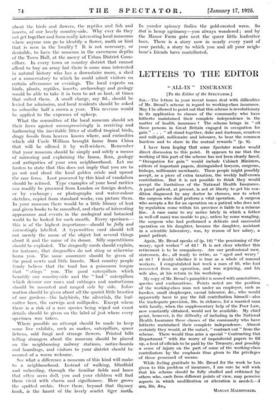LETTERS TO THE EDITOR
" ALL-IN " INSURANCE
[To the Editor of the SPECTATOR.] Sin,—The letters in your recent issues deal with difficulties of Mr. Broad's scheme in regard to working-class insurance. May I be allowed to point out that this scheme is revolutionary in its application to classes of the community who have hitherto maintained their complete independence in the matter of health insurance ? The scheme brings in " all those persons in Great Britain engaged in occupation for gain " . . . " all stand together, duke and dustman, countess and mill-girl, millionaire and labourer, to bear the common burdens and to share in the mutual rewards " (p. 9).
I have been hoping that some Spectator reader would direct discussion to this point. It appears to me that the working of this part of the scheme has not been clearly faced. " Occupation for gain " would include Cabinet Ministers, editors of important papers, distinguished lawyers, surgeons, bishops, millionaire merchants. These people might possibly accept, as a piece of extra taxation, the weekly half-crown contribution. But it is not possible to think they would accept the limitations of the National Health Insurance. A panel patient, at present, is not at liberty to get his con- dition diagnosed by any doctor he chooses, nor to select the surgeon who shall perform a vital operation. A surgeon who accepts a fee for-an operation on a patient who does not by regulation come within his province is liable to a ruinous fine. A case came to my notice lately in which a father (a well-off man) was unable to pay, unless by some wangling, the surgeon who had performed a delicate and successful operation on his daughter, because the daughter, assistant in a scientific laboratory, was, by reason of her salary, a panel patient.
Again, Mr. Broad speaks of (p. 18) " the pensioning of the weary, aged worker" of 63 ! It is not clear whether this -retirement is to be compulsory. Are our professional men. statesmen, &c., all ready to retire, as " aged and weary at 63 ? I doubt whether it is true as a whole of manual. workers. I congratulated last week a man of 69, who bad recovered from an operation, and was rejoicing, and his wife also, at his return to his workshop.
My copy of Mr. Broad's pamphlet is scored with annotations, queries and exclamations. Points noted are the position of the working-class man not under an employer, such as hawker, small shopkeeper, casual labourer, &c., who would apparently have to pay the full contribution himself—also the inadequate provision, 30s. in sickness, for a married man with family, when the supplementary help of the Poor Law, now constantly obtained, would not be available. My chief point, however, is the difficulty of including in the National Health Insurance those classes of the community who have hitherto maintained their complete independence. Almost certainly they would, at the outset, " contract out " from the scheme. There would thus arise a special " Contracting bent Department " with the worry of inquisitorial papers to fill up, a host of officials to be paid by the Treasury, and possibly a sense of injury on the part of some of the working-class contributors by the emphasis thus given to the privileges of those possessed of means.
While feeling gratitude to Mr. Broad for the work he has given to this problem of insurance, I am sure he will wish that his scheme should be fully studied and criticized by others who, each from different points of view, may perceive aspects in which modification or alteration is needed.-4 am, Sir, &e,
MARIAN MACDONALD.










































 Previous page
Previous page